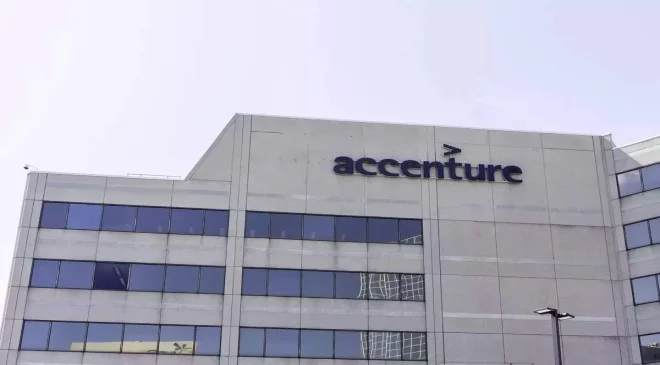Accenture is being pitched as a high-tech AI visionary. But a recent contract to fix an airline’s broken IT system tells a much different—and perhaps more lucrative—story.
The Narrative the Market Wants to Buy
On paper, Accenture (ACN) presents a compelling, if slightly confusing, picture for a value-oriented investor. The stock is trading nearly 37% below its yearly high, with a PE multiple hovering around 19.9. For a consulting behemoth with consistently strong operating margins (averaging 14.4% over the past three years), that looks like a discount. The company has navigated the recent macroeconomic turbulence without any of the catastrophic margin shocks that have plagued its competitors.
The story being sold to justify a rebound is all about the future. Accenture is making a massive, $3 billion multi-year bet on generative and agentic AI. The projections are ambitious: GenAI revenue is expected to triple to $2.7 billion in fiscal year 2025, with bookings nearly doubling to a staggering $5.9 billion. This is the narrative of a legacy giant successfully pivoting to become the indispensable partner for enterprise digital transformation in the age of AI. Acquisitions like Decho are meant to bolt on new capabilities, feeding a hungry market that wants to believe AI can solve everything.
It’s a clean, forward-looking story. But I've looked at hundreds of these corporate narratives, and this particular one feels a bit too clean. The growth numbers, when you strip away the AI hype, are modest. Last twelve months revenue growth was 7.4%, and the three-year average is a much more sedate 4.2%. This isn’t a high-flying tech startup; it’s a mature services firm. So, is the AI investment a true growth catalyst, or is it just a new, expensive coat of paint on a very old business model? And does the market really understand what "digital transformation" means in practice?
The Plumber Gets a 911 Call
Then, on October 31st, a different kind of story emerged. After another major outage, Alaska Airlines taps Accenture to audit technology systems. This wasn't a press release about a futuristic AI co-pilot or a dynamic pricing algorithm. This was a crisis response. You can almost picture the scene: the frantic calls, the departure boards frozen with the word "DELAYED" plastered across them, and the palpable frustration of 49,000 passengers whose travel plans had just evaporated.
Alaska had suffered two major IT outages in a matter of months. The most recent one grounded its fleet for eight hours, canceled over 400 flights, and forced the company to postpone its quarterly earnings call (a move that signals significant financial uncertainty). The cause wasn't a sophisticated cyberattack; it was a failure at its primary data center. A separate outage in July was blamed on a "critical piece of hardware."

This is where the glossy AI narrative collides with the grimy reality of corporate IT. Accenture is being brought in not as a visionary architect of the future, but as a master plumber called to fix a catastrophic leak in the foundation. Alaska’s problem isn't a lack of AI; it's a failure of the core, unglamorous infrastructure that every modern business depends on. They run a hybrid system—part their own data centers, part Microsoft Azure—and it's clearly under immense strain.
I find this contract far more revealing about Accenture's real value proposition than any AI revenue projection. For every dollar a company might spend on a speculative AI project, how many must they spend just to keep their ancient, creaking systems from falling apart? If a company like Alaska, which has boosted IT infrastructure spending by nearly 80% since 2019, can be brought to its knees by a data center failure, what does that say about the state of IT at thousands of other large enterprises?
This is the hidden engine of Accenture’s business. It’s not just about building the new; it's about fixing the old. It’s about untangling decades of mismatched hardware, migrating critical workloads, and ensuring the digital equivalent of the lights stay on. This work is messy, complex, and absolutely non-negotiable for clients.
The Narrative vs. The Balance Sheet
The market is currently valuing Accenture as if its future depends entirely on winning the AI arms race. That’s a mistake. The Alaska Airlines contract is a perfect microcosm of the company’s enduring, less-hyped, and arguably more durable business model. While the AI division chases high-margin, headline-grabbing projects, the core consulting and technology services are cleaning up the messes left by decades of technological debt.
The real investment thesis here might not be a speculative bet on GenAI. It might be a much simpler bet on corporate entropy. Things break. Systems fail. Complexity breeds chaos. And when the cost of that failure is measured in hundreds of canceled flights and millions in lost revenue, companies will pay almost anything to get it fixed. Accenture is one of the few global players with the scale and expertise to be that emergency service.
So while everyone is watching the shiny object of AI, the real, recurring revenue is in the plumbing. The current valuation might seem low because the market is skeptical of the AI growth story. But perhaps it's low because the market is completely ignoring the sheer, unstoppable demand for the high-stakes, unglamorous repair work that actually keeps the global economy running.

